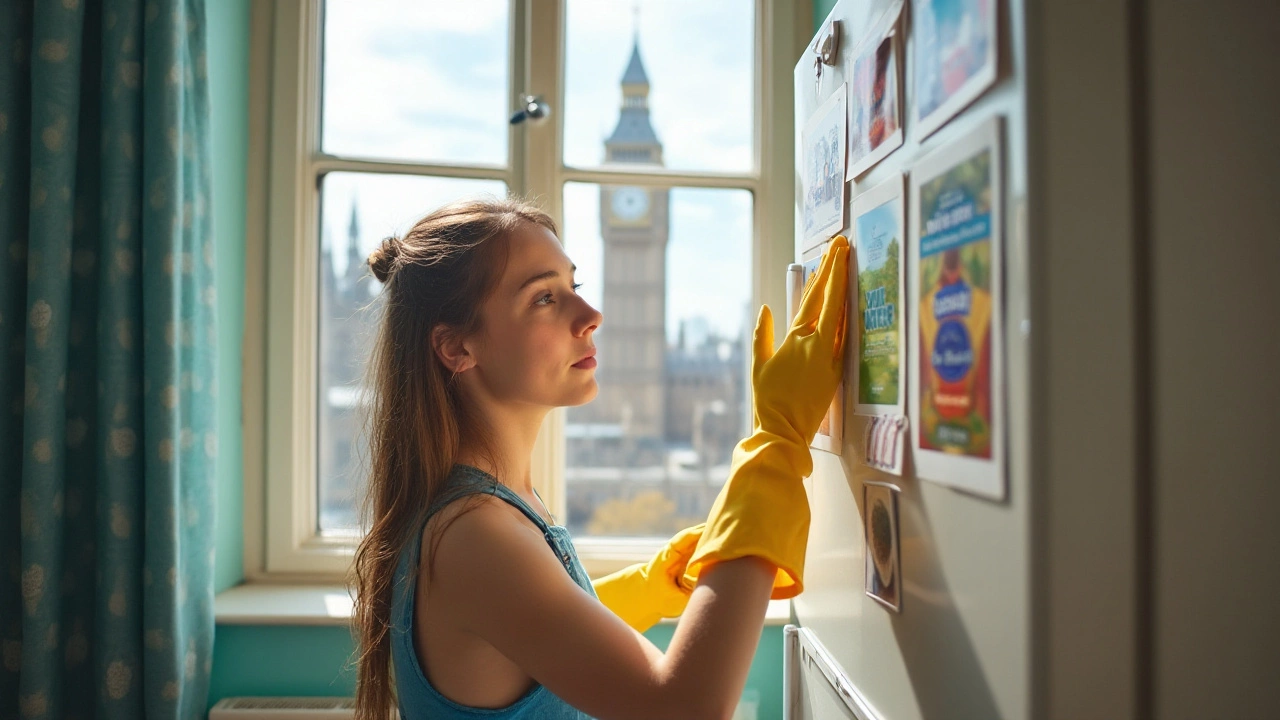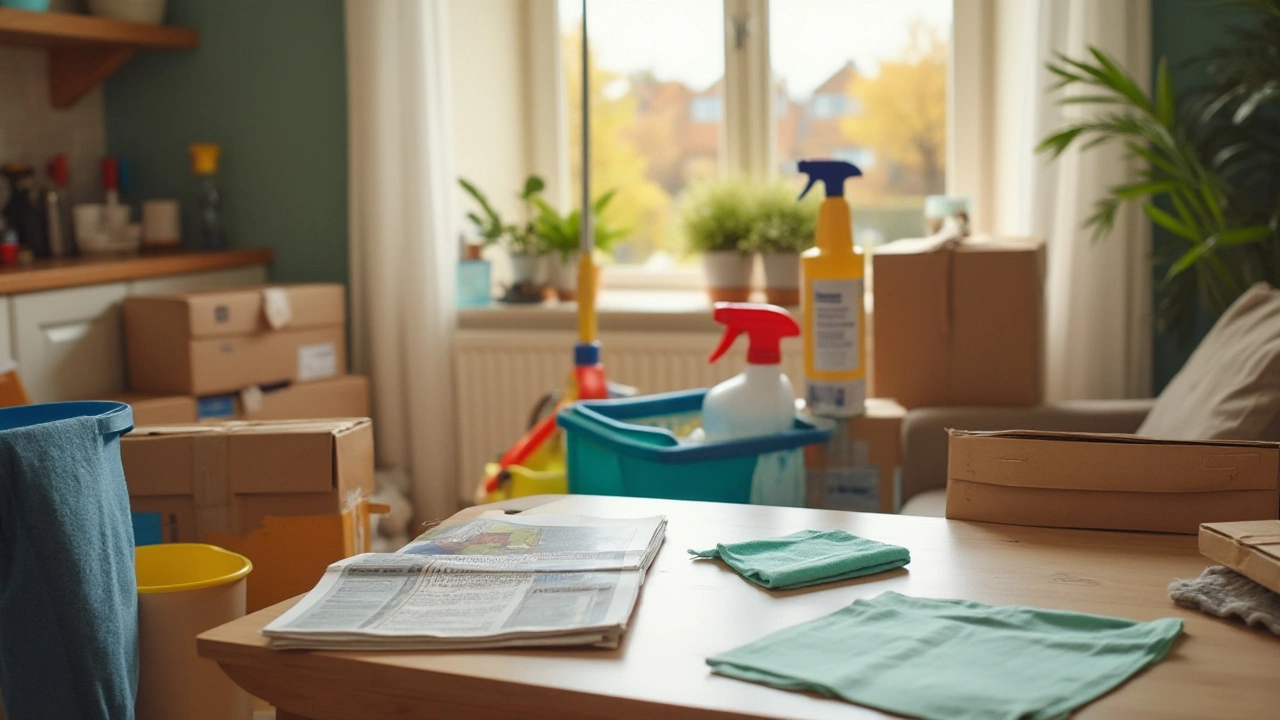Wrapping up a tenancy can be as nerve-racking as closing a chapter of a gripping novel. When those final boxes are packed and the moving van is loaded, a big question looms: Do you have to leave your rental property in a professionally cleaned state, or can a solid DIY clean suffice?
This question has ignited many debates, and Reddit, being a treasure trove of tenant experiences, offers a wide spectrum of opinions. Some tenants swear by professional cleans, fearing deductions from their deposit if they don't comply. Others claim that a good home cleaning can be just as effective if done with care and precision.
To tackle this predicament, it's wise to understand what is typically stipulated in lease agreements, and how former renters navigate through expectations and logistical challenges. With a blend of practical advice and real-life experiences, this article will guide you on ensuring your end of tenancy obligations are fulfilled smoothly without burning a hole in your pocket.
- Understanding Lease Agreements and Cleaning Requirements
- Reddit Discussions: Varied Tenant Experiences
- Tips for Budget-Friendly End of Tenancy Cleaning
- Navigating Landlord Expectations and Legal Obligations
Understanding Lease Agreements and Cleaning Requirements
When you first sign a lease agreement, it's akin to entering into an unspoken pact with your landlord. This agreement goes beyond just stating the rent and the duration of your stay; it often contains a slew of conditions, including those about cleaning. While many tenants skim through these sections, not fully absorbing the potential implications, they eventually prove crucial when your tenancy is nearing its end. You see, lease agreements might specify whether you're bound to perform an end of tenancy cleaning, using professional services or your own elbow grease, to restore the home to its original state.
Landlords typically expect you to return the property in similar condition as when you moved in. This doesn't mean you need to be scrubbing every nook and cranny daily, but rather a deep clean at the end is required. Most agreements use terms like "reasonable cleanliness" or "professional standards." The jargon can be vague but understanding it helps prevent disputes. Notably, a National Landlord Association survey found that nearly 56% of deposit disputes in the UK are linked to insufficient cleaning. These disputes may vary, but many stem from unmet expectations outlined in rental agreements.
A well-articulated lease will help you decipher what is precisely expected during the end of tenancy clean. While the requirements can differ based on jurisdiction and individual landlords, you often encounter clauses mandating carpets to be steam cleaned, or ovens to sparkle like new. Tenants navigating a maze of conditions and clauses often share their experiences on platforms like Reddit to seek guidance. Perhaps surprisingly, some seasoned renters emphasize reading between the lines and abiding by the agreed terms religiously, preventing future complications.
Key Points to Consider
Stepping more into the details, some lease agreements might go as far as requiring professional cleaners for specific tasks. Sock it to steam-cleaned carpets or windows polished to perfection, and then there’s the argument of general wear and tear versus cleanliness. For most tenants, it’s a balancing act. Talking to your landlord about their expectations can also be worthwhile and could lead to clearer directives if the lease agreement seems ambiguous. According to a notable property lawyer, "Communication is key to closing out tenant responsibilities, leave no clause unchecked." Not sticking to these stipulations might result in deductions from your deposit, or worse, disputes that could involve mediation or small claims courts. Trying to save a dime by skimping on cleaning could cost way more in the legal quagmire.
Next time you glance over your lease, remember it's more than just a contract—it’s the instruction manual to legally conclude your stay gracefully. Dive into those cleaning clauses, make a checklist, and perhaps coordinate with your landlord ahead of time to ensure both parties end the tenancy on agreeable terms. The lease is your roadmap to ensuring those last days in your rental are smooth, and deposits are returned without hiccup.

Reddit Discussions: Varied Tenant Experiences
Reddit is a bustling community where personal anecdotes blend with collective wisdom, and the topic of end of tenancy cleaning is no exception. Browsing through Reddit threads on this subject reveals a fascinating array of stories and advice from tenants who have faced the quandary of whether to opt for professional cleaning at the end of their lease. While some users recount positive outcomes when following their lease agreements to the letter, including hiring professional cleaners, others share clever hacks for executing a spotless job themselves and still recovering their full deposits.
In one well-upvoted thread, a Redditor narrates their success in challenging a landlord's claim for a professional clean by documenting their own cleaning efforts with photographs and receipts for purchased cleaning supplies. They detail a meticulous approach, cleaning each room from top to bottom and ensuring everything from ovens to baseboards sparkled, which resonated with other tenants looking for reassurance that a diligent DIY effort can indeed meet landlord standards. It's all about knowing what falls under the tenant's responsibilities and leveraging it to negotiate effectively when discrepancies arise.
"The best tool I had was meticulous record-keeping. I anticipated a clean dispute, so I took clear, timestamped photos of every corner I scrubbed, and it paid off," mentions Samantha, a seasoned renter and frequent Reddit contributor, highlighting the importance of transparency and preparation.
Often, the key to a successful DIY clean lies in understanding the nuances of what landlords or property managers might be expecting. Some Reddit users have compiled comprehensive checklists — wisely including often-overlooked areas like filter vents, behind the appliances, or under seldom-moved furniture — ensuring that tenants cover all angles and avoid unnecessary charges. These checklists are not only handy but provide peace of mind for tenants who wish to resolve the matter without professional aid.
Contrastingly, other stories caution about unpredictable landlord preferences and local laws that might necessitate a professional service. In rent-controlled areas or prestigious properties where standards are explicitly enforced, tenants may find themselves better off complying outright than wrestling over subjective judgments of cleanliness. Yet, the majority opinion on Reddit tends to be in favor of personal handiwork, emphasizing resourcefulness and individual responsibility over yielding to assumed norms unless legally or contractually obligated.
If statistics were to show, a poll conducted within the tenant communities revealed a 65% preference towards self-managed cleaning methodologies versus professional assistance, primarily driven by cost-saving motives and a genuine enthusiasm for hands-on results. This ongoing discussion continues to evolve as more renters come forth with stories, keeping the conversation alive and resource-rich for newcomers facing a similar crossroads.
Ultimately, the Reddit discourse serves as a testament to the diverse nature of renting experiences, empowering tenants with practical insights, whether they choose to roll up their sleeves or recruit external help. As digital communities grow, their role in delivering real-time, peer-driven content becomes more critical for tackling life’s ordinary, yet consequential tasks like exiting a lease with dignity and perhaps without debt.

Tips for Budget-Friendly End of Tenancy Cleaning
As you approach the end of your lease, your wallet might already feel the pinch from moving expenses. Fret not, for cleaning doesn't have to be a budget-buster. With a sprinkle of strategy and a touch of elbow grease, you can leave your rental sparkling without a heavy dent in your finances. First and foremost, it's crucial to prioritize. Tackling cleaning in phases will help you avoid feeling overwhelmed, and it ensures that every nook and cranny gets the attention it deserves. Kick off the process by creating a checklist of all rooms and their specific cleaning needs. This is where a keen eye for detail reaps big dividends: identifying high-traffic areas or spots prone to dirt accumulation can streamline your efforts significantly.
Once you have your action plan, gather your &strong>cleaning arsenal. Great news—high-quality doesn’t mean high cost. Many effective cleaning solutions are probably already sitting under your sink. White vinegar is a versatile wonder, excelling in cutting through grime, deodorizing, and even streak-proofing glass surfaces. Baking soda, too, is fantastic for eliminating persistent odors and tackling stubborn stains. For a refreshing twist, add a few drops of essential oils to your homemade solutions. They’re affordable and leave a lingering, pleasant scent. Did you know that lemon juice combined with olive oil can polish wood surfaces to a perfect shine? Such DIY solutions exemplify just how resourceful you can be!
Another money-saver is the power of delegation. If living with roommates, assign sections of the property to each person, turning cleaning into a collective effort. Not only does this lighten the load, but it also creates a sense of accountability. Remember, the key is tackling high-traffic areas first—think kitchens, bathrooms, and hallways. These sections often require the most attention due to frequent use.
Set achievable goals. For instance, the bathroom often becomes a hotspot for mold and mildew. Begin by scrubbing tiles with a mix of baking soda and vinegar. It’s effective and gentle on surfaces. Mirrors can be wiped down to a gleaming finish with just vinegar and newspaper. When dealing with harder stains or lime scale, a paste of baking soda and vinegar left to sit briefly can work wonders.
Here's an organized approach to cleaning:
- Declutter first – remove all personal items to get a clear view of what needs cleaning.
- Dust high to low – always work from top shelves to the floor to ensure particles don’t settle on already-cleaned surfaces.
- Focus on fixtures – remember to clean light switches, doorknobs, and cupboard handles.
- Finish with floors – save mopping and vacuuming till the end for maximum efficiency.
Finally, testimonials from experts can sometimes help steer you in the right direction. According to Home Management Gurus, "Strategically focusing on one task at a time and using multi-purpose solutions can significantly cut down expenses without sacrificing quality."
If you're still nervous about passing inspection and withholding a penalty from your deposit, consider affordable cleaning services that specialize in last-minute touch-ups. They often offer packages that are less than the cost of full-scale professional cleaning. Also, frequent communication with your landlord during this time can help manage expectations and clarify any concerns about what constitutes acceptable cleanliness. By adopting these strategies, you're bound to achieve a successful end of tenancy cleaning, keeping both your landlord and wallet satisfied.

Navigating Landlord Expectations and Legal Obligations
Understanding what your landlord expects when you vacate a property can be crucial in ensuring you get your deposit back with ease. The lease agreement is often your first source of truth in deciphering these expectations. Many rental agreements will outline specific requirements for end of tenancy cleaning, but it’s important to read the clauses carefully as language can sometimes be deliberately vague. Often, landlords require that the unit be left in a 'clean and tenantable' condition, but what exactly does that mean? Does it necessitate a thorough professional cleaning session, or will a meticulous DIY effort suffice? These are all questions renters might juggle as their lease term comes to a close.
In some cases, tenants have argued their case successfully by comparing the cleanliness of the property upon moving in with the condition as they leave. This is where photographic evidence becomes an invaluable tool. Taking photos when you move in and as you move out can provide a comparison point if disputes arise. Reddit threads are filled with anecdotes of tenants sharing mixed experiences; some claim victory by proving the property was returned in equal or better condition than received. An anonymous user once remarked, “I handed everything over in better condition than when I moved in—cleanliness includes the fridges, the ovens, and windows,” which clearly paid off in terms of deposit return.
Legal obligations can vary depending on the region, so it's wise to familiarize yourself with local rental laws which might influence cleaning requirements. For instance, some places allow landlords to mandate professional cleaning explicitly in contracts, while others disallow it unless there are specific complaints about the property’s condition. This variability often leads tenants to seek guidance from tenant law services to appropriately navigate their obligations without overspending on unnecessary cleaning services.
If your lease explicitly demands professional cleaning, you may need to arrange for this well ahead of your move-out date. However, be cautious—some landlords have been known to pocket cleaning fees without actually engaging services, a malpractice tenants often advise vigilantly guarding against. Confirming the use of your fees through proof of professional service is a step worth considering if you're caught in such a bind. An interesting statistic reveals that around 20% of tenant-landlord disputes stem from deposit reductions related to cleaning, often because of misunderstandings about these obligations.
An insightful Reddit comment advised renters to always ‘be proactive and communicate’ when in doubt about cleaning requirements. It’s a good practice to ask your landlord for clarification on what they specifically expect as your lease ends, maybe even negotiating certain terms if necessary. Open dialogue can preemptively diffuse potential conflicts. Plus, if your retirement schedule is tight, hiring a professional cleaner might be more than merely meeting expectations—it could also be about time management.
